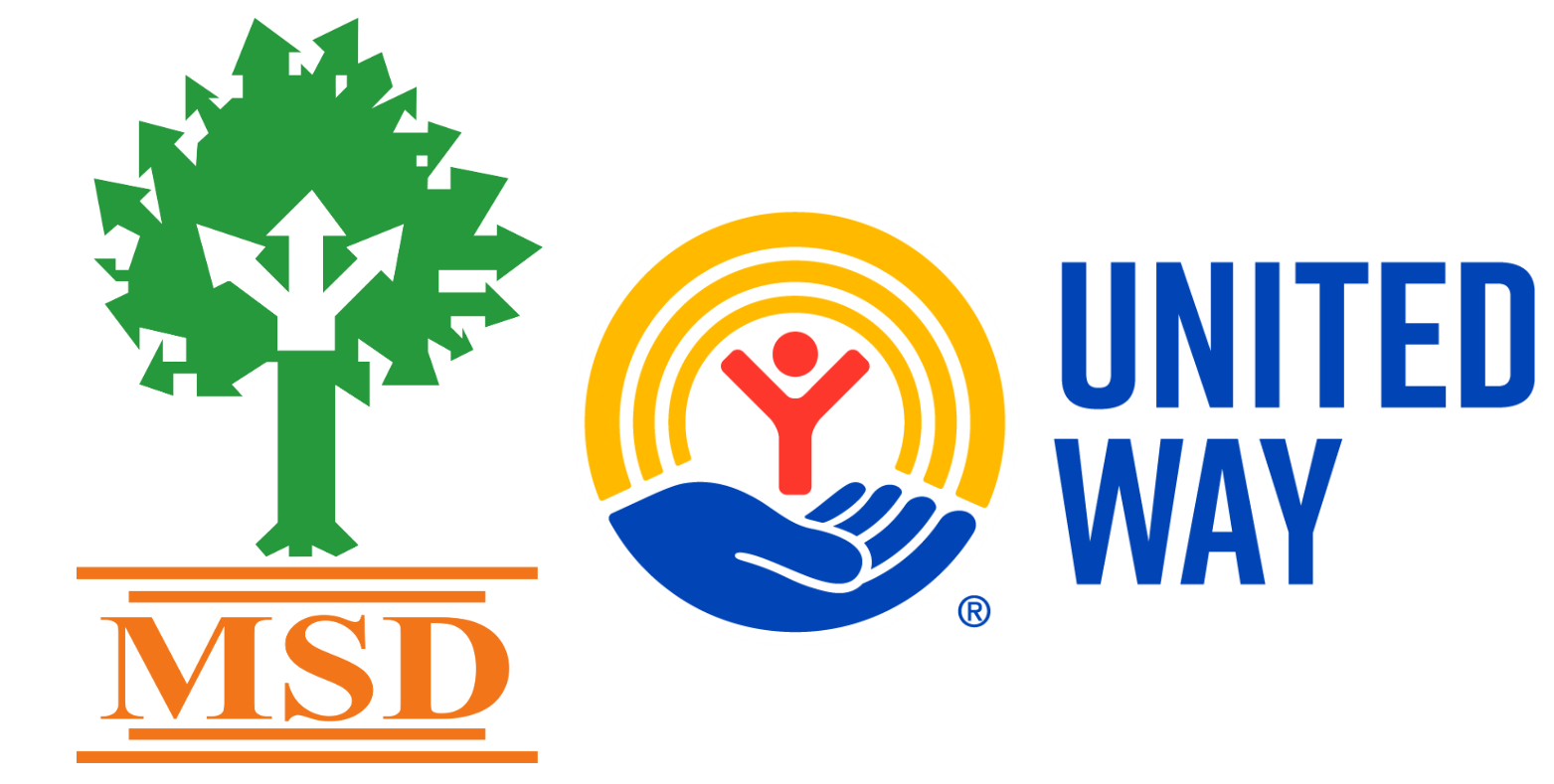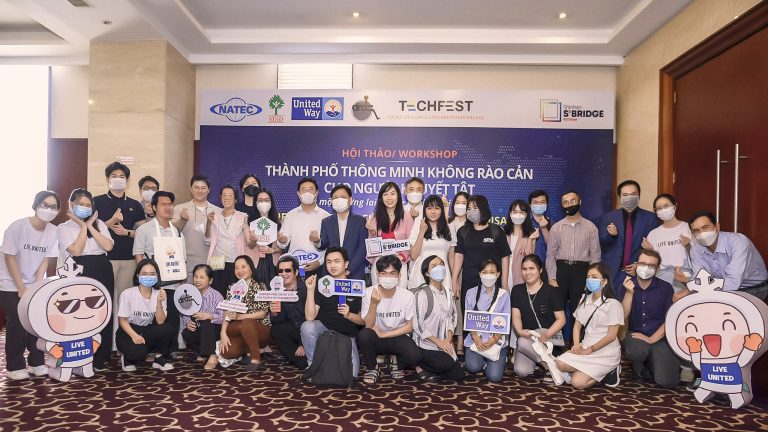HO CHI MINH CITY, 29.03.2022 – Management and Sustainable Development Institute (MSD) – United Way Vietnam, in collaboration with the National Agency for Technology Entrepreneurship and Commercialization Development, United Way Worldwide, Disability Research And Capacity Development (DRD) and partners, organized the Workshop “Barrier-free Smart City for People with Disabilities – For a future that leaves no one behind”. The event fell within the framework of the Techfest 2022’s Social Challenge and Innovation Village, and also responded to World Creativity and Innovation Day 2022 in an effort to create an open space that promotes collaborative exchanges among stakeholders on experimentation, orientation and solutions for smart city building, inclusive, barrier-free development for everyone, including people with disabilities. The event was sponsored by Shinhan Square Bridge Vietnam.
The workshop was attended by Mr. Pham Hong Quat – Director General of the National Agency for Technology Entrepreneurship and Commercialization Development, Ministry of Science and Technology; Mr. Le Quoc Cuong – Deputy Director of the Department of Information and Communications of Ho Chi Minh City; Ms. Nguyen Phuong Linh – Executive Director of MSD Institute – United Way Vietnam, Ms. Hooyung Young – Representative of Shinhan Square Bridge Program, experts on smart cities, Vietnamese and Korean startups, social organizations belonging to the network of people with disabilities in Ho Chi Minh City, and groups of people with disabilities who are beneficiaries of the Shinhan Square Bridge Vietnam 2021 Project.
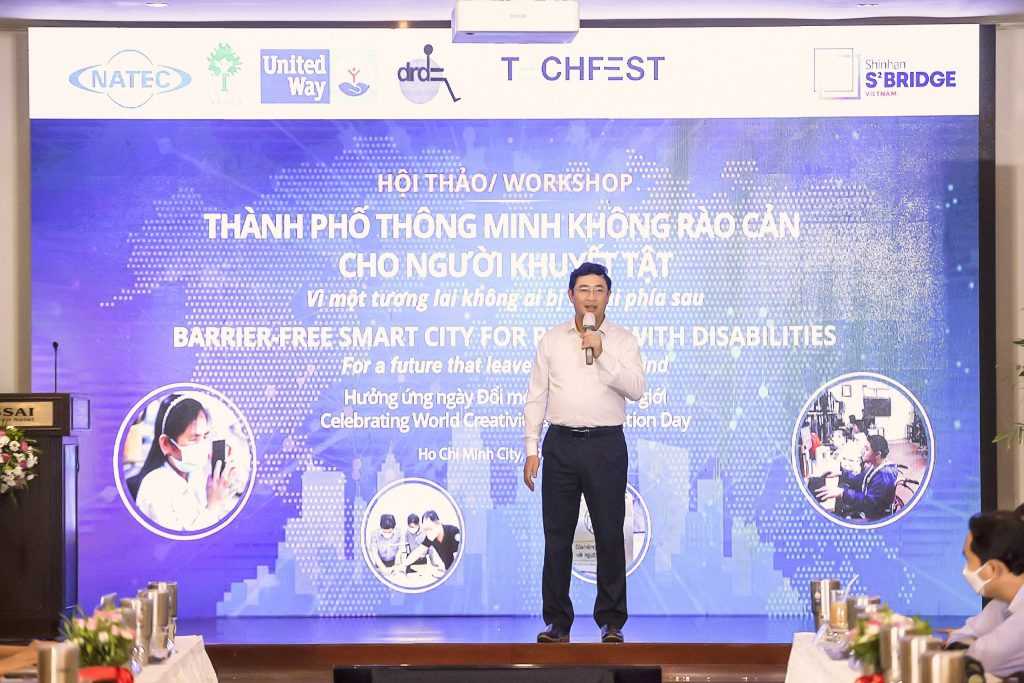
In the opening remarks, Mr. Pham Hong Quat emphasized the importance of innovation and technology application in building smart cities. “The development of science and technology helps people lead better, more convenient and easier lives with great benefits.”,he said, “However, this can also increase inequality in society, when people from marginalized groups who are not equipped with knowledge and equipment to keep up with new technology are easily left behind. Vietnam is facing many major problems, especially in the post-COVID 19 era, the vulnerable groups are the ones who need to be focused on and supported, this is also a limitation in Vietnam’s access to education. Therefore, I hope the risk is also an opportunity for us to work together to provide support initiatives for this subject.”
Mr. Quat highly appreciated the experimental models and experiences of the startups (www.livinglabvietnam.org) of the Shinhan Square Bridge program displayed and performed during the event. He affirmed: “These are very meaningful initiatives, innovations that serve people, belong to people and for people. I have seen here potential innovations for a miniature smart city that is barrier-free for everyone, not just people with disabilities. ”
Shinhan Future’s Solutions – When technology is applied to support marginalized groups
Since 2021, MSD Institute – United Way Vietnam has coordinated the implementation of the Shinhan Future Solutions project – Shinhan Square Bridge with the financial support of the Shinhan Financial Group Hope Foundation. Implemented in 7 provinces and cities, the project aims to improve the value and social impact through the application of technology and innovative solutions. In 2021, the project focused on implementing 3 main models including (1) Enhancing quality job training and employment for youths and women in the new context, (2) Barrier-free Smart Community for people with disabilities and (3) Smart School Governance. In Ho Chi Minh City, the project focuses on building a Barrier-free Smart City model for people with disabilities, with many practical and specific activities towards supporting and improving the quality of life and promoting social inclusion, enabling people with disabilities to participate to the fullest extent in socio-economic activities.
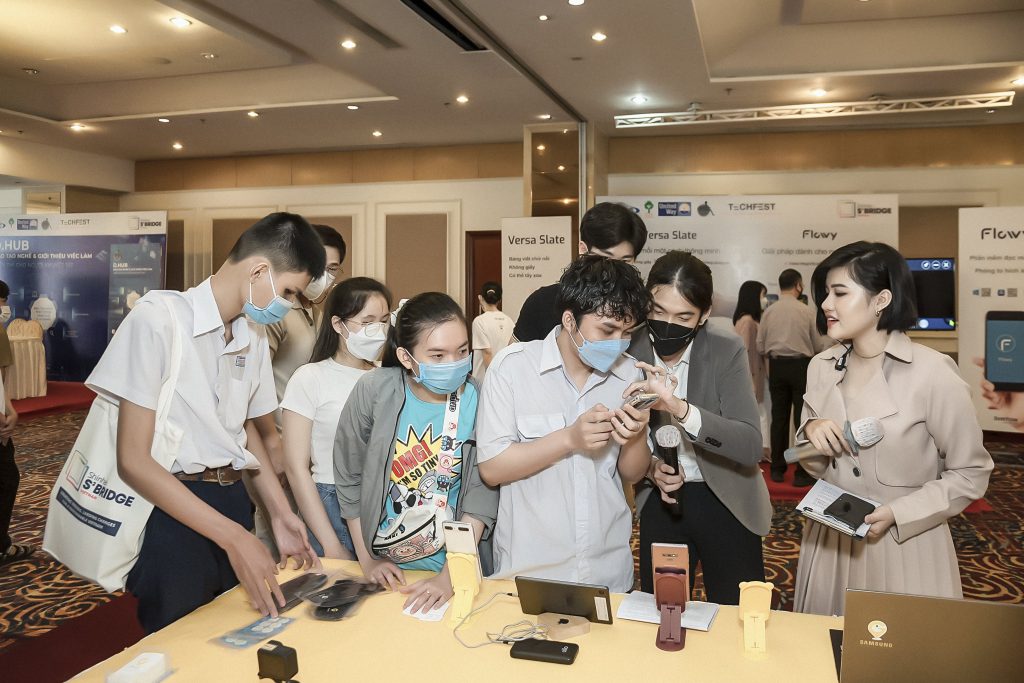
Ms. Nguyen Phuong Linh – Executive Director of MSD – United Way Vietnam shared: “The Shinhan Square Bridge Vietnam model was built and implemented based on an approach promoting an experimental environment that provides opportunities for startups to test their innovative products and solutions in the real user community. This approach can also be used in the smart city approach – which places the human needs of diverse groups at the centre. Today we also talked about smart city, I believe “smart” is not only about technological intelligence but also an attitude, a commitment to serving people. Smart cities serve not only a few people, a group of people or influencers with the ability to access, but also assure barrier-free, equal and equitable access for all, including people with disabilities. At the most basic level, in a city of several million people, you can see the presence of people with disabilities participating in traffic, commuting in the city, going to school, eating, shopping, working, entertaining…”
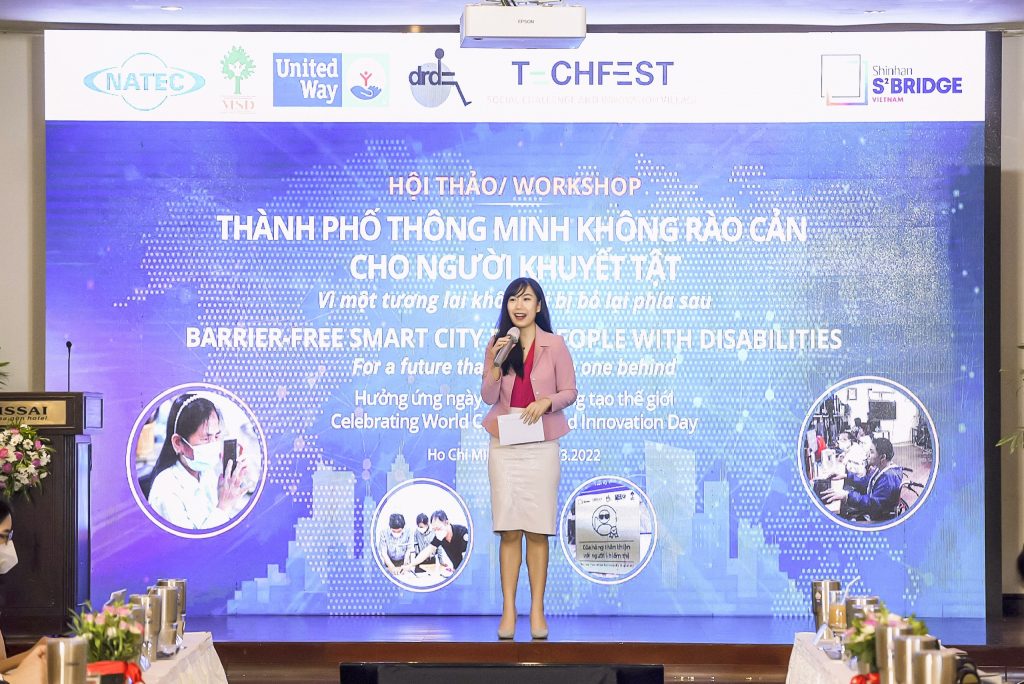
In 2021, with the accompaniment of 6 startups and 113 organizations, the project supported 27,812 Vietnamese people, including: 586 young people and people with disabilities who received quality job training; 240 blind people who had access to smart technology that helps integrate into the community; 40,769 students and 2,108 teachers in Lao Cai, Ninh Thuan and Hung Yen who had access to a smart school system. The project accompanied the National Festival for Innovative Startups TechFest 2021 to support more than 2.5 million Vietnamese youth to do business and start a business.
Recognizing the results of the Shinhan Future’s Solutions project, Ms. Hooyung Young – Vice President of United Way Worldwide Southeast Asia, South Korea and Japan, Representative of Shinhan Square Bridge Vietnam Program expressed: “When implementing the Shinhan Future’s Solutions project in Vietnam last year, our goal is to support in the best way for startups in the process of creating social impacts, addressing the challenge of the post COVID-19 period. In the past time, with the impact of the pandemic, we have encountered many difficulties, but it is fortunate that we have very reliable partners in the development of projects such as NATEC, local authorities, MSD Institute, social organizations… With the model of smart city building and the growing development of science and technology, we very much hope that this project can bring an equal and better life to the vulnerable group so that they will not be left behind.”
Also during the Workshop, the two businesses participating in the project had the opportunity to share the model of products to support the visually impaired, including LBSTech’s “Smart city platform for solving mobility problems for the disabled people” and OverFlow’s “Products/Services for the visually impaired through Versa Slate Braille and “Flowy” app”.
Barrier-free city tectonic solutions for people with disabilities
Ho Chi Minh City is the largest urban area in Vietnam, densely populated and the flagship of the national economy. In order to take advantage of the fourth industrial revolution to develop the city quickly and sustainably, the city has approved the Scheme to implement the scheme to make Ho Chi Minh City a smart city by 2025; and promulgated the Digital Transformation Program to 2025.
Sharing about the project implementation process, Mr. Le Quoc Cuong – Deputy Director of the Department of Information and Communications of Ho Chi Minh City said: “After 4 years of implementation, the project of building Ho Chi Minh City into a smart city in the past period has achieved many positive results. Many new technologies have been implemented in many localities, helping to improve management efficiency and gradually removing bottlenecks in areas, especially during the COVID-19 pandemic. The city has identified that one of the important tasks for economic recovery and development is to implement digital transformation in a comprehensive manner, develop digital economy, build a digital society, promote digital government, and build smart cities. Of course, it is not enough if only the city government is committed and motivated, we are excited that more and more parties are involved in supporting the city to transform digitally into a smart city that serves people.”
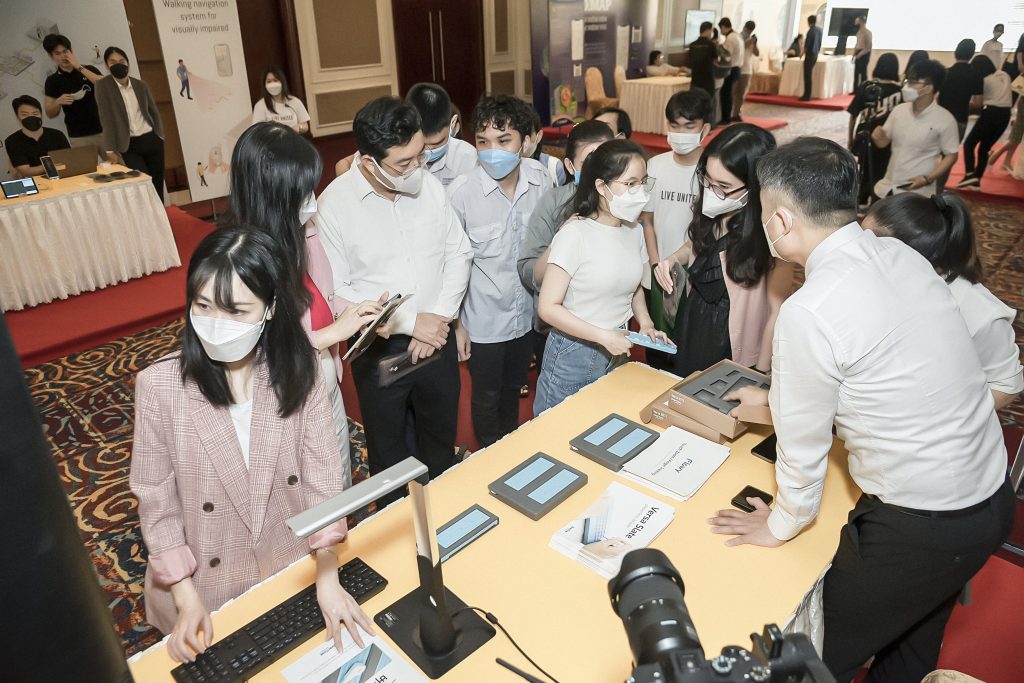
The orientation of the Department emphasizes focusing on the following solutions:
- Expanding and supplementing technological solutions to serve marginalized groups, especially people with disabilities, creating conditions for people with disabilities to participate in all aspects of socio-economic activities;
- Implementing a program to support smartphones for people in difficulty;
- Develop a database on social protection to better serve the care of disadvantaged people.
- Research about virtual assistants to assist people with disabilities.
- Encourage enterprises to develop digital platforms and digital applications to support people with disabilities to participate in the digital society and digital economy activities.
The conference followed with a talk “Barrier-free Smart City for People with Disabilities – For a future that leaves no one behind”.
Explaining the concept of “smart city”, Dr. Trinh Tu Anh affirmed: “For every city, smart city is the journey, not the final destination. When building a smart city, we are not looking for perfection, we are using technology to solve problems that arise in the city itself, and we are looking for sustainable development. “Smart cities” should be based on the following criteria: naturally favorable; efforts to build authorities and government; people; convenient mobility and life.”
From his many years of working and supporting people with disabilities to integrate, Mr. Nguyen Van Cu shared: “Thanks to digital transformation, people with disabilities can reduce barriers to obtain and improve their knowledge and even learn information about vocational schools through smartphones. In order not to be left behind, people with disabilities themselves also strive to improve their own knowledge to keep up with the development of technology and participate in the development of society, contributing to the local economy.”
As a research and production unit of tools and technologies to support people with disabilities, Mr. Rafael Masters proposed: “In order to increase integration opportunities for people with disabilities, it is necessary for applications and technology tools, in addition to integrating many powerful and easy-to-use support features, to have appropriate prices for the majority. Furthermore, public transport in a smart city needs to be disability-friendly by building infrastructure for people with disabilities to use, in line with the needs and desires of people with disabilities. The technology sector is gradually developing and supporting a lot for people with disabilities, and people with disabilities are helping us a lot in the process of collecting data and research to improve quality.”
RMIT University Representative – Mr. Seng Kiat Kok emphasized the role of young people: “We should reach out to the group of young people to raise awareness, build vision, help them form the habit of observing and seeing the problem, thereby directing the actions that can be taken to help the disadvantaged group. Young people have a very fast uptake, they are very good at using technology and they will be the ones who create the best and most appropriate products to help people with disabilities.”
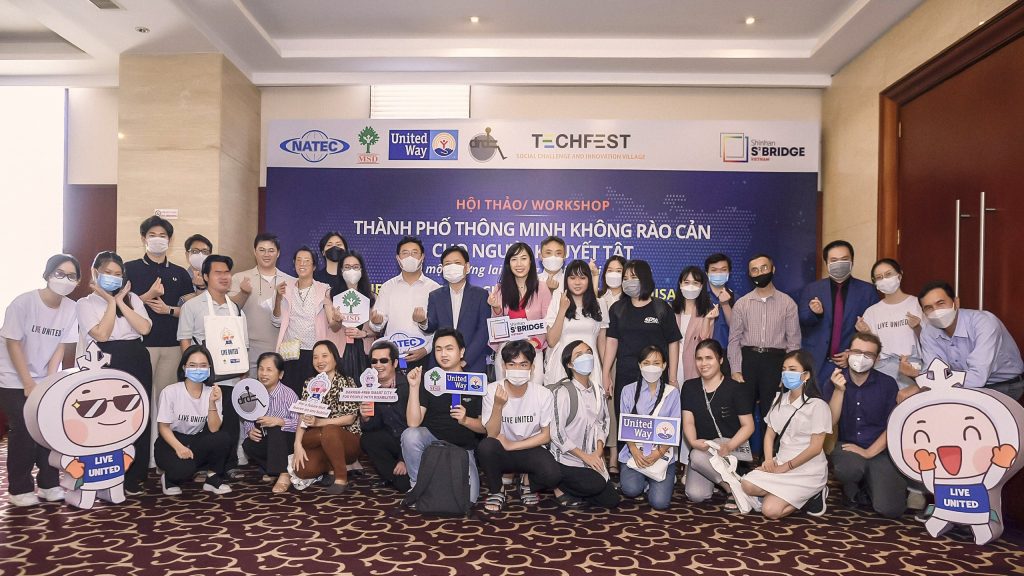
The workshop closed with the message: Collaborative solidarity and innovative spirit are the prerequisites for creating trends, leading change for sustainable development, leaving no one behind. In 2022, NATEC, Social Challenge and Innovation Village, the Shinhan Square Bridge program led by MSD Institute – United Way Vietnam will continue their efforts to promote stakeholders’ connections to support startups and organizations participating in Open Society Innovation for the Inclusive Development of Smart City. All information is updated at: www.livinglabvietnam.org.
Review the program here.
About Shinhan Square Bridge Vietnam Program
The Shinhan Future Solutions Program (Shinhan S2 Bridge Vietnam) is a cross-border and cross-sector collective impact initiative, designing and building an inclusive community that gives opportunities for all in Vietnam. By leveraging innovative tech solutions offered by proven startups, it will help citizens connect to available resources and new opportunities for future success. The program has been implemented in Vietnam since 2021.
About Management and Sustainable Development Institute (MSD) – United Way Vietnam
MSD – United Way Vietnam envisions a world of justice and equality, where all individuals and their families can achieve their human potential through good education, financial stability, and healthy lives. We are taking efforts to improve sustainable lives by mobilizing the caring power to the united partnership of an ecosystem for sustainable development. MSD focuses on the following areas: (1) Education, Protection, Development; (2) Improving Income and Quality of Life; (3) Environmental Health with a cross-cutting approach to sustainable development, promoting solidarity – collaboration, ensuring equality and participation, applying innovation.
